
Who says you can’t grow garden-fresh foods in the city? Thousands of urban gardeners are growing their own food in Chicago – many for the first time – in more than 650 community garden plots scattered throughout the third largest metropolitan area in the United States.
The organic gardens were spearheaded by the Peterson Garden Project, founded by my friend LaManda Joy. This award-winning non-profit is working hard to make urban gardening the norm, not the exception. But to understand how the community garden initiative got started – you’ll need to look back in time. About 70 years, in fact.
As Seasonal Wisdom readers know, this blog is fascinated with looking at how historical wisdom can guide our lifestyles today. And Peterson Garden Project is an excellent example. In fact, this 21st century initiative is inspired by the massive scale and effectiveness of Chicago’s Victory Gardens of World War II.
Chicago was particularly active during the government’s efforts to get Americans growing and preserving more foods at homes, schools and community gardens. The wartime gardens allowed the nation to prevent a food shortage in the United States and with the fighting troops.
During the 1940s, Chicago started 1,500 community Victory Gardens, and more than 250,000 people began home gardens in just four years, according to LaManda Joy, founder and president of Peterson Garden Project.
A WWII Victory Garden is shown above. This community garden was located on Peterson Avenue, just west of Artesian looking west, in Chicago.
“The Victory Garden movement varied greatly across the country,” explains Joy. “Everyone participated, not just the cities. In Chicago, 90 percent of Victory Gardeners had never gardened before. That’s the real accomplishment – the organizational system made the effort very successful.”
The concept for Peterson Garden Project came at a time when the busy executive was burnt out from work and business travel. When her husband suggested she find an interesting subject to study, Joy found herself increasingly drawn to the wartime Victory Gardens.
“My parents belong to the Greatest Generation,” says Joy. “They taught me how to grow food growing up, so I thought the Victory Gardens would be interesting to explore.”
This photo shows her parents standing in front of her great grandfather’s garden around 1946-1947, “shortly after my dad got out of the occupied forces,” she adds. “That’s where my dad learned to garden, and that’s where he taught me.”
Inspired by the wartime Victory Gardens, the Peterson Garden Project started officially in April 2010. The first project was to create an organic edible community garden located in the original Victory Garden spot (shown in the b/w photo above) from the mid-1940s.
“I thought it would be great if 20 people joined,” she remembers. “But the project turned out to be the largest edible, organic community garden in Chicago that year. Best of all, 50 percent of the gardeners had never done it before.”
In 2012 – 70 years after those first Victory Gardens were built – the Peterson Garden Project continues to grow into something beautiful in Chicago.
No longer based from the previous Victory Garden location, the two-year-old Peterson Garden Project now has six organic gardens around Chicago, where more than 2,400 gardeners of all ages grow food in about 650 plots.
Four Pop-up Victory Gardens have been organized by Peterson Garden Project volunteers on unused urban land; some privately owned; others on city property.
“Vibrant community hubs now exist in these gardens, where there was once neglected and ugly unused land,” says Joy.
“Our agreements are for a minimum of 2-3 years,” she explains. “These aren’t long-term community gardens. They are places where people can learn to grow food and become more involved with their communities – just like in the original WWII Victory gardens.”
Peterson Garden Project volunteers also manage a small food garden at Mather High School.
An Edible Treasures Garden at Chicago’s Field Museum of Natural History was created in partnership with the museum, Peterson Garden Project, Seed Savers Exchange and Jewell Events & Catering.
Keeping history alive was an important theme in this museum’s community vegetable garden. The vegetable seeds were personally selected by Diane Ott Whealey, founder of Seeds Savers Exchange, the largest non-profit seed bank in the United States.
Edible Treasures vegetables are all open-pollinated heirlooms. So, they demonstrate how gardeners can preserve history by saving seeds and passing homegrown vegetables down from generation to generation.
Sharing the Harvest: A ton of food (yes, a TON!) this summer is expected to be donated to five local food/nutrition programs in Chicago thanks to 50 Grow2Give garden beds managed by volunteers. A percent of the garden beds are also available on scholarship for lower income individuals.
“We estimate we have more than 2,400 people gardening with us in 2012,” says Joy. “A large majority we taught to garden. That’s the best part.”
Want to Start A Community Victory Garden?
Here are three tips from Joy:
- Have a plan and stick to it.
- Create a leadership team, which can be the core group to make things happen.
- Make the garden “your happy place,” advises Joy. “Have enough rules for people to be safe and for the garden to thrive, but let the community form and create the world they want in the garden space.”
Bobby Wilson, President of The American Community Gardening Association, likes to say that “community gardens are 10 percent garden and 90 percent community,” according to Joy, who sits on the board.
“This garden project is massive,” she admits. “But the parts you can’t see are the relationships that form, the communities that come together, the friendships that develop and the life-long skills of organic food growing that people can share with others. That’s the real miracle.”
New Victory Garden Poster – Support this Initiative, Plus Get Cool Art!
Acclaimed artist Joe Wirtheim has designed another über-cool poster in The Victory Garden of Tomorrow series in honor of the Peterson Garden Project and Joy’s mission.
“Like me, Joy is interested in America’s history of gardening during times of hardship,” explains Wirtheim. “She provides us with a realistic perspective of what happened back then, and where we can go today. I hope this print represents the vision, hope and legacy of urban gardeners.”
Order this poster. Proceeds will benefit the non-profit organization’s efforts to build more edible gardens in Chicago.
Get more information at www.petersongarden.org. Also follow them on Facebook and Twitter.
Learn more about Victory Gardens and see old government posters in my interview with Rose Hayden-Smith, renowned University of California historian on wartime gardens.
Read more about heirlooms with a history and Seed Savers Exchange in this article I wrote for Horticulture Magazine.
See more of The Victory Garden of Tomorrow artwork.
Are you involved in a community garden project? If so, we’d love to hear about your efforts in the comment section below.
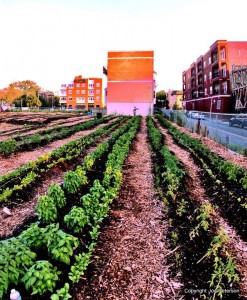
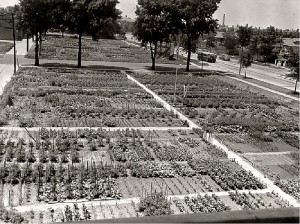
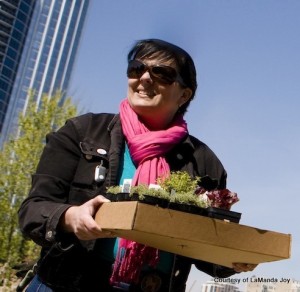
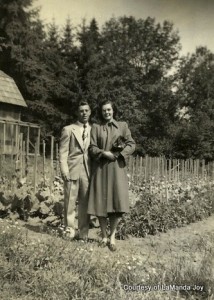
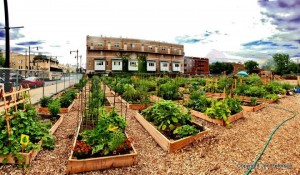
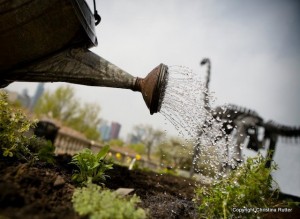
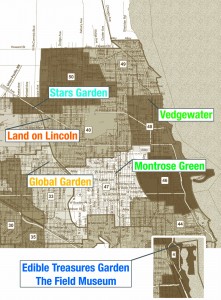
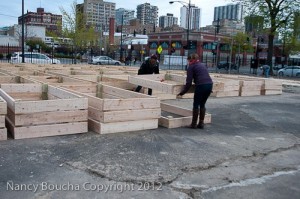
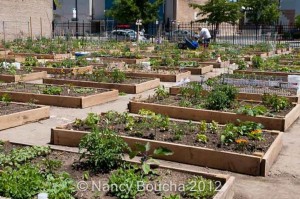
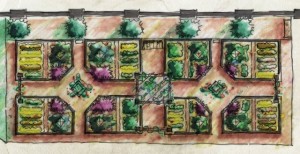
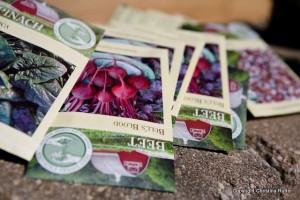
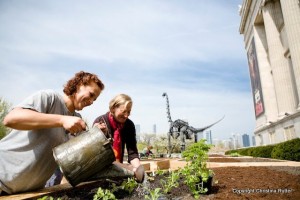
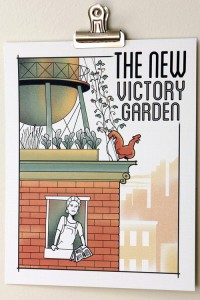











{ 8 comments }
Fantastic story about this project as well as the history of Victory and community gardens. The tips were a nice touch too. Thanks for the great share!
Thanks so much, Robin. It’s inspiring to see so many people learning to grow food in the city. And I love that history is guiding the way! Teresa
This is a fabulous write up about what LaManda is growing in Chicago. I can’t wait to see if for myself on Monday. Great write up Teresa – you are a wonderful writer!
Hello Teresa! I’ve been a long time follower of LaManda and love what she is doing. Thank you for telling us more about Chicago’s Peterson Garden Project and some of the history behind Victory Gardens. Thank you!
Great article. Very inspiring. If only every city could get on board the gardening wagon!
Bren, Nicky and Victoria: Thanks for your nice messages. I appreciate it! You all are great gardeners, and you understand how important and inspiring this type of program can be for a city like Chicago. The Peterson Garden Project is really doing great work! Teresa
We have been working on starting community gardening for next year and are finally getting some great press and excitement. Reading about Chicago refuels my enthusiasm. Thanks for such a well written piece – made me want to hop over to learn more!
Wendy
Hi Wendy: Thanks for your nice words. We appreciate it! Peterson Garden Project is a great inspiration for any gardener. Meanwhile, best of luck with your community garden. It’s a very noble project, and the world could certainly use more gardens, especially for the community. Hope to see you again at Seasonal Wisdom, and happy holidays. Teresa
Comments on this entry are closed.
{ 5 trackbacks }